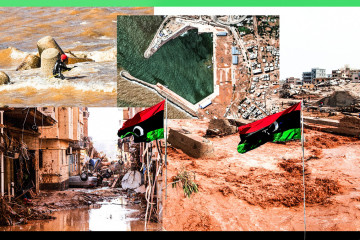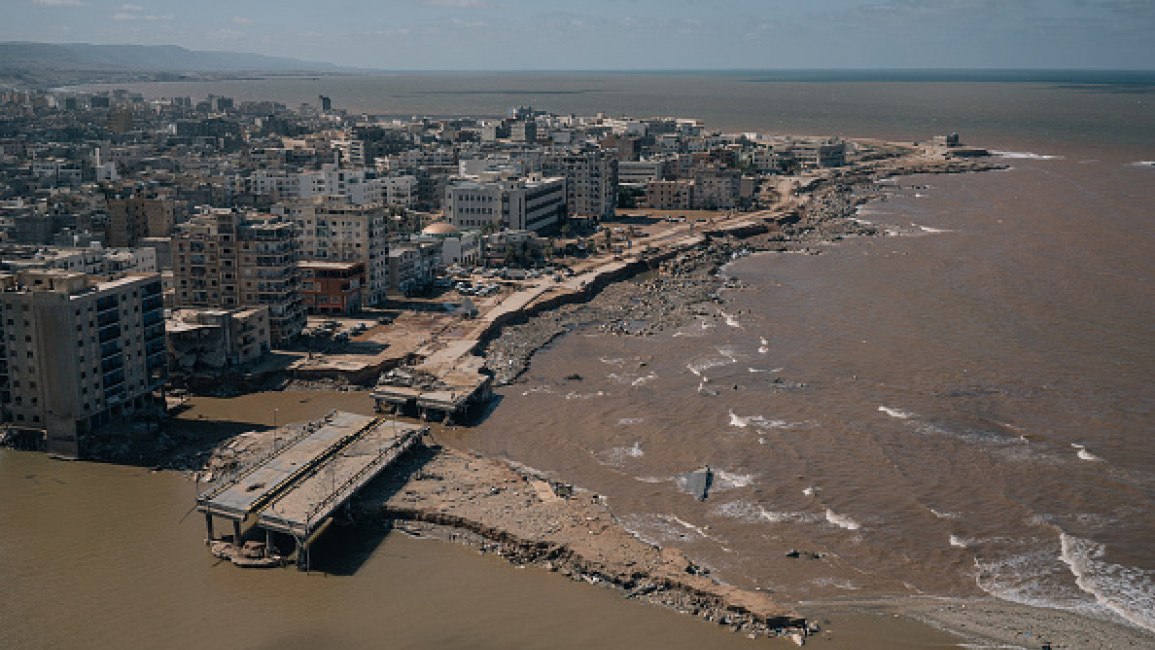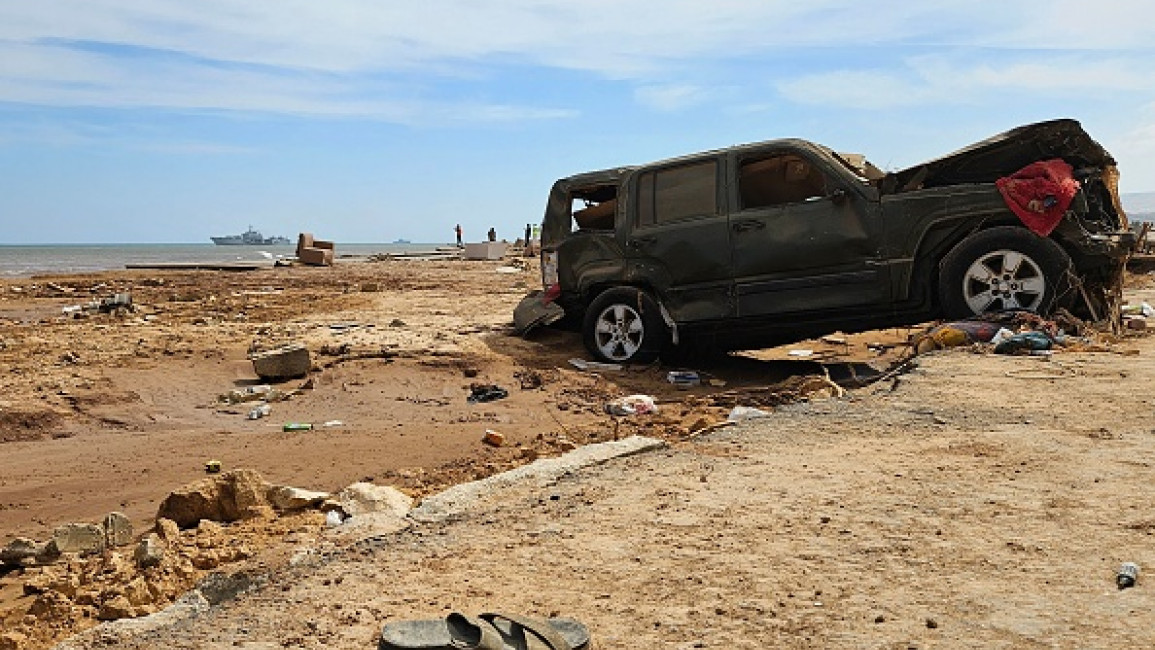NATO NATION BUILDING
The political failures behind Libya's deadly floodsIn-depth: Libya's divided and dysfunctional political system bears part of the blame for the magnitude of loss in the catastrophic flooding.

Libya has been left reeling from the aftermath of Storm Daniel, a hurricane-strength storm that hit the central and eastern Mediterranean over a week ago.
Striking Benghazi, Al Bayda, Merc, and, in particular, Derna in eastern Libya, officials have so far put the death toll at well above 11,000, but the tally could rise even higher.
Over 10,000 remain missing a week after the disaster, with Yale University professors recently declaring that the storm could be the worst in the continent's recorded history.
The collapse of dams built five decades ago in the port city of Derna, home to 90,000 people, unleashed devastating walls of water that swept away entire neighbourhoods and decimated infrastructure.
"Neglect and corruption have been rampant for some time, and the flood response has exposed this for all to see"
Despite the unprecedented magnitude of the storm, the extent to which the city was prepared for such a disaster has raised a number of concerns, most notably surrounding state neglect, which is now exacerbated by a divided political authority and widespread insecurity.
Furthermore, the challenges in getting aid to Libya following the tragedy, as well as the lack of coordination and administrative power, highlight the absence of strong public institutions across the country.
Since 2014, eastern Libya has been under the control of Libyan National Army (LNA) leader Khalifa Haftar, while the rival western-based government located in Tripoli oversees infrastructure projects and has access to national funds.
The lack of maintenance for the dams, however, goes back further. A decade after they were damaged following storms in 1986 a Libyan government study showed cracks and fissures in their structures.
Analysis Ufuk Necat Tasci
Two years later, an Italian engineering firm recommended the construction of a third dam to protect the city after confirming the cracks.
In 2007, the government of Muammar Gaddafi hired a Turkish company to conduct repairs, but payment issues delayed the work until 2010 and, eventually, they halted after the revolution in the country.
A state-run audit agency reported in 2021 that the two dams hadn’t been maintained despite $2 million being allocated for the project in 2012 and 2013.
Libya’s top prosecutor Al-Siddiq Al-Sour has said an investigation will be launched into the collapse of the dams, which will include scrutinising previous governments and local authorities.

Officials have so far put the death toll at well above 11,000.
But the degree to which a fractured and dysfunctional political system can respond to the disaster, and create safeguards for the future, remains unclear.
"Neglect and corruption have been rampant for some time, and the flood response has exposed this for all to see," Sami Hamdi, editor-in-chief of the International Interest, told The New Arab.
The dominance of individual warlords and militia alliances means that institutions have little weight across the country, impacting service provision and general governance, the analyst said.
"Popular opinion is not considered of particular importance among the militias or political factions, and their control and authority is one that is imposed through the use of force and patronage"
“The first point of contention is why orders were issued to stay indoors rather than evacuate when everyone knew a storm was on its way. Second, and more significantly, there is little evidence of or hope for accountability, given the lack of trust in local institutions or processes," Hamdi added.
But the degree to which a fractured and dysfunctional political system can respond to the disaster, and create safeguards for the future, remains unclear.
"Neglect and corruption have been rampant for some time, and the flood response has exposed this for all to see," Sami Hamdi, editor-in-chief of the International Interest, told The New Arab.
The dominance of individual warlords and militia alliances means that institutions have little weight across the country, impacting service provision and general governance, the analyst said.
"Popular opinion is not considered of particular importance among the militias or political factions, and their control and authority is one that is imposed through the use of force and patronage"
“The first point of contention is why orders were issued to stay indoors rather than evacuate when everyone knew a storm was on its way. Second, and more significantly, there is little evidence of or hope for accountability, given the lack of trust in local institutions or processes," Hamdi added.
"There have been no resignations or admissions of fault."
Instead, Hamdi says, the established powers and militias are engaging in a PR race to evade accountability, reaffirm their 'wise' leadership (in the words of Haftar's son), and cement their legitimacy by insisting that all help must go via them.
Even within the West-East political divide, which shows no signs of abating, the city of Derna itself had remained isolated within the wider eastern region.
Analysis Samira Elsaidi
"Derna has always been a peculiar, contrarian city, characterised by a spirit of rebellion and protest," Jalel Harchaoui, an associate fellow at the Royal United Services Institute (RUSI), told The New Arab.
"Partly for this reason, Haftar developed an enmity against Derna, a violent phase that lasted until early 2019. Hostility still existed in 2023, as Derna's municipal elections in August 2023 were interrupted and prevented by Field Marshal Haftar," Harchaoui added.
According to the analyst, deep antagonism between the Haftar regime and Derna remains a serious issue that must be monitored in the wake of the deadly floods.
"For this and other reasons, the Haftar family and its friends will be tempted to divert, distort, and subvert international aid efforts meant for Derna," Harchaoui added.

Over 10,000 remain missing a week after the disaster.
A 2018 report by a UN panel of experts said that the behaviour of militias and various groups had resulted in the “misappropriation of Libyan State funds and the deterioration of institutions and infrastructure”.
But despite a consensus among the Libyan public that political factions are unpopular, the continued delay in elections or a political roadmap means that for the foreseeable future national divisions look set to continue.
"Rather than uniting, political factions are more likely to begin competing over aid routes, reconstruction contracts, and financing frameworks in order to entrench their positions"
"In this regard, popular opinion is not considered of particular importance among the militias or political factions, and their control and authority is one that is imposed through the use of force and patronage rather than a willingly conferred mandate from the Libyans," Hamdi told TNA.
Rather than uniting, political factions are more likely to begin competing over aid routes, reconstruction contracts, and financing frameworks in order to entrench their positions further following the natural disaster, Hamdi adds.
Indeed, jostling to be the contact point for relief efforts and international aid is a means of claiming political legitimacy that Libyans would not grant them at the ballot box.
Dr Ufuk Necat Tasci is a political analyst, academic, and journalist. His research areas and interests include Libya, the foreign policy of Turkey, proxy wars, surrogate warfare, and new forms of conflict and history
Follow him on Twitter: @UfukNecat
A 2018 report by a UN panel of experts said that the behaviour of militias and various groups had resulted in the “misappropriation of Libyan State funds and the deterioration of institutions and infrastructure”.
But despite a consensus among the Libyan public that political factions are unpopular, the continued delay in elections or a political roadmap means that for the foreseeable future national divisions look set to continue.
"Rather than uniting, political factions are more likely to begin competing over aid routes, reconstruction contracts, and financing frameworks in order to entrench their positions"
"In this regard, popular opinion is not considered of particular importance among the militias or political factions, and their control and authority is one that is imposed through the use of force and patronage rather than a willingly conferred mandate from the Libyans," Hamdi told TNA.
Rather than uniting, political factions are more likely to begin competing over aid routes, reconstruction contracts, and financing frameworks in order to entrench their positions further following the natural disaster, Hamdi adds.
Indeed, jostling to be the contact point for relief efforts and international aid is a means of claiming political legitimacy that Libyans would not grant them at the ballot box.
Dr Ufuk Necat Tasci is a political analyst, academic, and journalist. His research areas and interests include Libya, the foreign policy of Turkey, proxy wars, surrogate warfare, and new forms of conflict and history
Follow him on Twitter: @UfukNecat
No comments:
Post a Comment